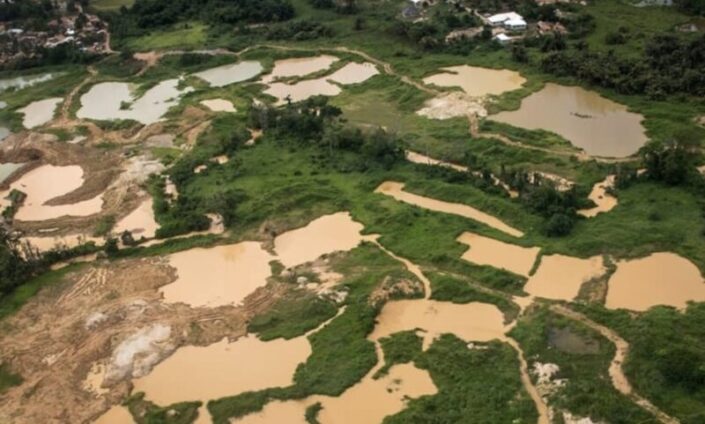
Audio By Carbonatix
The Institute of Statistical, Social, and Economic Research (ISSER) has raised concerns about the environmental impact of Ghana’s gold exports, which now account for over half of the country’s export revenue.
In its latest State of the Ghanaian Economy Report, ISSER calls for urgent steps to evaluate and address these environmental costs to ensure sustainable practices in mining and agriculture, cautioning that failure to act could harm Ghana’s tourism sector.
“Gold exports account for over 50% of export revenue, but there is a need to ascertain the environmental costs and address them to ensure sustainable mining and agricultural practices,” ISSER stated.
The report underscores that while gold mining brings significant revenue, it also presents environmental challenges that could disrupt agriculture and hinder tourism, two other key pillars of Ghana’s economy.
The environmental impact of mining, especially small-scale and illegal mining activities, has become a pressing issue for Ghana, affecting river bodies, farmlands, and forest reserves.
ISSER’s Director, Professor Peter Quartey, highlighted the interconnected risks that unregulated mining poses.
“The effects on tourism cannot be discounted,” he warned, noting that Ghana’s natural landscapes and biodiversity, which attract visitors, are at risk of degradation from unsustainable mining practices.
The report also emphasizes the importance of balancing economic gain from gold exports with environmental sustainability.
“To sustain the benefits of gold exports, we must integrate environmentally conscious practices that will not compromise agriculture or tourism,” ISSER suggests.
The institute’s assessment points to the need for stricter regulatory frameworks and enforcement to curb the negative impact of mining on critical natural resources.
In a bid to protect tourism and agriculture, ISSER recommends that policymakers implement measures to limit mining activities in sensitive areas, such as near water bodies and protected forests.
According to the report, preserving Ghana’s tourism potential is vital for diversification and long-term economic resilience.
“Tourism relies heavily on our natural resources, and if these are compromised by unchecked mining, we stand to lose more than we gain from gold exports,” ISSER cautioned.
Latest Stories
-
‘Adom FM’s Strictly Highlife’ lights up La Palm with a night of rhythm and nostalgia
5 minutes -
Ghana is rising again – Mahama declares
5 hours -
Firefighters subdue blaze at Accra’s Tudu, officials warn of busy fire season ahead
5 hours -
New Year’s Luv FM Family Party in the park ends in grand style at Rattray park
5 hours -
Mahama targets digital schools, universal healthcare, and food self-sufficiency in 2026
6 hours -
Ghana’s global image boosted by our world-acclaimed reset agenda – Mahama
6 hours -
Full text: Mahama’s New Year message to the nation
6 hours -
The foundation is laid; now we accelerate and expand in 2026 – Mahama
6 hours -
There is no NPP, CPP nor NDC Ghana, only one Ghana – Mahama
6 hours -
Eduwatch praises education financing gains but warns delays, teacher gaps could derail reforms
7 hours -
Kusaal Wikimedians take local language online in 14-day digital campaign
7 hours -
Stop interfering in each other’s roles – Bole-Bamboi MP appeals to traditional rulers for peace
8 hours -
Playback: President Mahama addresses the nation in New Year message
8 hours -
Industrial and Commercial Workers’ Union call for strong work ethics, economic participation in 2026 new year message
10 hours -
Crossover Joy: Churches in Ghana welcome 2026 with fire and faith
10 hours

